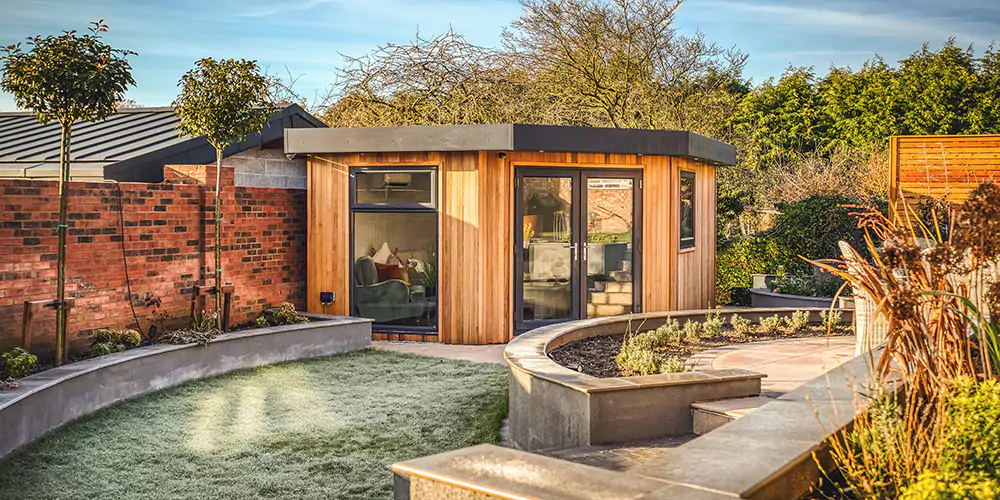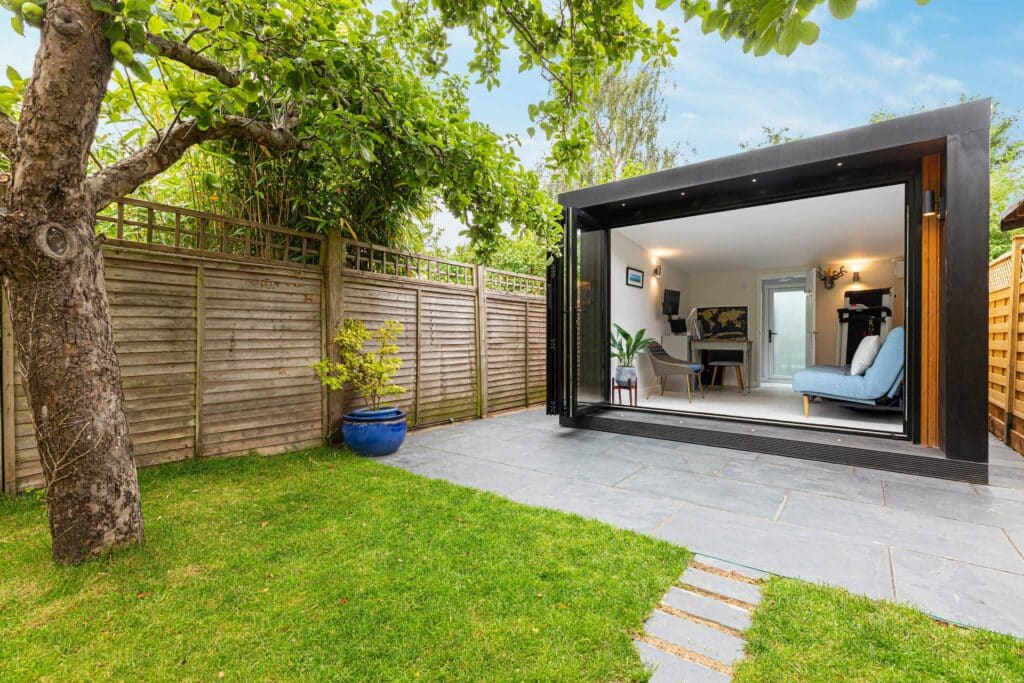Good Facts On Planning Permission For Garden Offices
Wiki Article
What Planning Permission Do You Need To Build Garden Rooms, Etc. Terms Of Highways And Traffic Concerns?
The impact of highways can affect the necessity for planning approval when building gardens, conservatories, or outhouses. Here are the main concerns: Visibility and Sight Lines
If the structure is obstructing visibility for drivers that are entering or exiting the property, or affects sight lines at junctions or bends in the road, then planning permission is required. The planning authority must assess whether or not a building could cause a risk to the safety of motorists.
Distance to the highway
Typically, structures near the highway such as front gardens or extensions close to the street require planning permission. There are specific distance regulations to ensure that the structure does not interfere with the safety of the highway.
Access and Egress
Planning permission is needed to change access points such as adding new driveways or modifying existing ones in order to allow for the construction. This is to ensure the access and exit points are safe for vehicles and do not disrupt traffic flow.
Parking arrangement:
Planning permission is required when the new structure needs more parking or impacts existing parking. The authority for planning will evaluate whether the new development has sufficient parking or does not cause congestion on the streets.
Traffic Generation
The development that is expected to generate an increase in traffic, for example gardens that are used for business that have clients who visit, require approval from the planning department. The assessment will focus on the impact on traffic levels and safety.
Impact on Pedestrian Access:
Planning permits are required if the proposed structure is going to encroach upon pedestrian paths or pavements. To ensure safety for pedestrians and accessibility, it's vital to not block the walkway.
Impact of Construction on Highways
Planning permission may be needed to limit the impact that construction activities have on highways. The authority for planning may set conditions to limit the disruption to roads during construction.
The Runoff and Drainage of Water:
Another aspect to consider is how the development can affect drainage and runoff. This includes its impact on the road. Planning permission assures that the structure will not create drainage or flooding problems that could negatively impact the road.
Street Furniture and Utilities
The project has to be approved if it could impact street furniture (e.g. lamp posts and signs) or underground utilities (e.g. electrical cables, water pipes). The Planning authority will collaborate with relevant agencies to address any issues.
Highway Authority Guidelines
Local highway authorities might have guidelines and requirements specific to developments near highways. Planning permits ensure that the rules are adhered to in order to ensure road safety.
Noise and disturbance from traffic:
The planning permission is needed for any new structure that will cause more disturbance and noise to traffic (e.g. a garden office that receives deliveries or visitors).
Public Transport Accessibility:
The planning permission is required to permit developments that may impact public transport facilities such as stations or bus stops. Planning permission is needed for any developments that might affect public transport infrastructure like train stations or bus stops.
Highway concerns are a key factor in determining whether an extension, conservatory, garden room, outhouse, garden office, or extension can be accepted. It is essential to ensure that any proposed development does not adversely affect road safety traffic flow, pedestrian safety or access. Consulting with your local authority for planning as well as the highway authority at the beginning of the planning process can help address these concerns and help ensure that the development is in compliance with all applicable regulations. View the recommended garden rooms extensions for website info including outhouse building, garden room vs extension, garden office hertfordshire, what size garden room without planning permission uk, 4m x 4m garden room, outhouse, garden office hertfordshire, conservatories and garden rooms, garden rooms in St Albans, conservatories and garden rooms and more.

What Planning Permits Are Required For Garden Rooms, Etc. With Regard To The Impact On The Environment?
The impact on the environment when constructing an outdoor space outhouse, conservatory, or garden offices can affect the need for planning approval. Here are the most important environmental considerations to take into account: Biodiversity and Wildlife:
If the proposed structure would affect wildlife habitats within your area, such as local hedgerows, trees or ponds, you'll require planning permission. It is possible to conduct an ecological survey in order to minimize and determine the effect.
Habitats, Species and the Environment:
The site has to be approved for development if it has or is in close proximity to species that are protected (e.g. Bats and Newts) or habitats that are protected (e.g. Sites of Special Scientific Interest SSSI). It is important to take specific measures to protect these species.
Preservation Orders for Trees Preservation Orders
If the proposed structure requires the removal or modification to trees covered by TPOs, planning permission is required. The local authority will assess the potential impact of the proposed structure and may require other mitigation measures or planting replacement.
Flood Risk and Water Management
Planning permission is needed to build near the shoreline or in flood-prone areas. A flood risk assessment (FRA) could be required to ensure the structure does not create more flood risk and also has drainage solutions that are adequate.
Sustainable Construction Methods for Sustainable Construction
It is possible to obtain planning permission in order to use sustainable construction materials and practices. This could include energy efficiency, carbon footprint of building materials, and insulation.
Surface Runoff and Drainage
One of the most important aspects to consider to consider for the environmental is how the new structure will affect the drainage system and the runoff of surface water. Planning permission will ensure that drainage systems to stop waterlogging and flooding have been put in place.
Soil and Stability of Land
A permit for planning is required when the proposed development could impact the stability of the soil or land. This could include problems such as a soil erosion or subsidence particularly on steep slopes.
Air Quality
Planning approval is required for any development that could impact the local air quality, such as those located near industrial areas or major highways. It ensures air pollution levels remain within acceptable levels, and mitigation measures are put in place.
Noise Pollution:
Planning permission is required when the garden area, or any extension of it, is likely to cause significant noise. The local authority assesses noise levels as well as potential effects on the environment and neighbors.
Waste Management:
It is important to manage garbage properly both during and following construction. Planning permission assures that there are adequate provisions for recycling and disposal of waste to minimize environmental impacts.
Energy Efficiency
Planning permission may be accompanied by conditions for energy efficient technologies like solar panels or high-performance glass. This will help reduce the carbon footprint.
Environmental Regulations
Environmental regulations such as the UK Environmental Protection Act must be adhered to by any development. Planning permission assures that all legal obligations are met, and that the development is sustainable for the environment.
In short, the planning approval for garden rooms, conservatories, outhouses, gardens offices or extensions should be considered in light of a broad variety of environmental effects. Talking with your local planning authority at the beginning of the process of planning is crucial to know the specific requirements and ensure that the proposed development is sustainable and in compliance with all relevant regulations. Have a look at the recommended garden room or conservatory for website examples including what size garden room without planning permission uk, how to lay decking on soil, composite summer house, garden rooms in St Albans, luxury outhouse, how to get power to a garden room, garden rooms, garden rooms hertfordshire, Tring garden rooms, composite garden office and more.

What Planning Permits Are Required For Garden Rooms, Etc. With Regard To Utilities And Infrastructure
Infrastructure and utilities are essential when planning to construct garden rooms or conservatories, as well as outhouses, gardens offices and extension. They can also influence whether planning permission is required. Here are the main factors to consider. Water Supply and Drainage
If the building being constructed requires connection to drainage or water supply systems, a planning approval could be required. Local water authorities may be required to consider the impact of any new structure on the water and sewage systems in the area.
Gas and Electricity Connections:
If you are planning to connect a new building to an electric or gas supply, you might require an authorization for the project. For these connections, it is important to be in compliance with requirements of the building codes and safety regulations.
Utility Easements
Planning permission may be needed when the structure is located in an easement (areas which are designated for infrastructure and utility lines). The local utility provider might require approval for the construction within these zones.
Septic Tanks and Sewage Systems
A planning permit is required for any new construction that requires a septic or an onsite sewage treatment system. It is vital that these systems are in line with all environmental regulations as much as health standards.
Drainage Surface Water Management and Surface Water Management
You may need to get planning permission for drainage and runoff from surface waters. It could be necessary to adopt measures to avoid flooding as well as water pollution.
Access to Utilities for Construction
The planning permission may be needed in order to allow temporary access to utilities like water, for example, during construction. The temporary connection has to meet safety and environmental standards.
Local impact on infrastructure:
Planning permission is required to evaluate the impact of the new structure on the local infrastructure, such as roads, utilities, as well as public services. Local authorities will assess if existing infrastructure can accommodate the development.
Waste Management:
Planning permission can include requirements for waste management and recycling during and after construction. In order to minimize environmental impact, there should be provisions for recycling and waste disposal.
Energy Efficiency:
Installation of energy-efficient parts or systems for renewable energy, like solar panels or heat pumps, in new structures might require approval for planning. Environmental and building regulations are required to be met.
Telecommunications and Internet connectivity:
Planning permission might be needed if the new structure is likely to require internet or telecommunications connections. In order to make sure that telecommunication infrastructure meets the requirements and standards It is crucial that the infrastructure conforms to these.
Access to the Road and Footpath:
You may need planning permission to build new access roads or footpaths, or modify existing ones. It is crucial to follow the safety regulations and standards applicable to the construction of footpaths and roads.
Accessibility to public transport:
Planning permission may be needed when a building is in conflict with the public transport system (such bus stations or stops). Conformity with the regulations and standards for public transport infrastructure is crucial.
In the end, infrastructure and utilities aspects are essential in determining whether or not a planning permit is required for extensions, garden rooms, outhouses, or gardens offices. Consult the local planning authority at the earliest possible point during the planning stage to ensure compliance with relevant guidelines and standards. Read the recommended 3m x 2m garden office for website info including composite summer house, outhouses for garden, copyright outbuildings, best heater for log cabin, garden rooms brookmans park, what size garden room without planning permission uk, copyright garden rooms, what is a garden room, garden room permitted development, what size garden room without planning permission and more.
